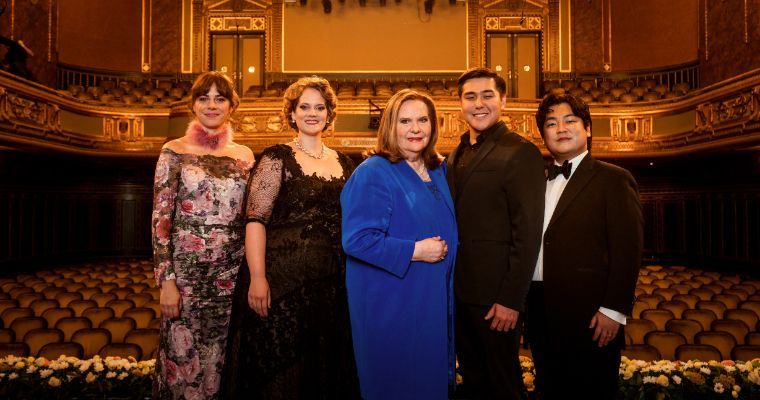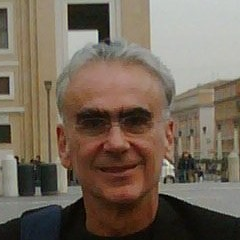“I wasn’t interested in being a teacher who creates mirror images of herself. My artistry is dedicated to bringing forth new artists. I do this with heart and soul. It’s my duty.”
I spoke to Éva Marton in one of the ornate meeting rooms of the Liszt Ferenc Academy of Music. The seriously Art Nouveau building has been the venue for the Éva Marton Singing Competition since it was launched in the spring of 2014. It would be difficult to imagine it anywhere else, considering Marton’s deep ties to the institution. She’s not only an alumna but has served as one of its professors, its head of department and now is its Professor Emerita. A storied singing career spanning more than four decades has taken her to the world’s most famous stages, and her interpretations of Turandot, Tosca and Elektra continue to set the bar for others, along with her acclaimed verismo roles.
And with all the roles she’s sung as one of her era’s most memorable dramatic sopranos, it takes but a moment for Marton to harken back to one of them, when asked what she hoped to achieve with the singing competition that she called to life.
“In the third act of Parsifal, Kundry sings, to serve. To serve.” Spreading her arms, Marton nodded reflectively. “I served the arts all my life. So, the idea is to continue serving and helping, to help the singers of the future.”
Organising and adjudicating a field of hundreds of aspiring singers to find the very best is not an easy brief even during normal times, let alone during a pandemic that shut down most of the world’s stages for nearly two years. But after being postponed from 2020 to this year, the IV International Éva Marton Singing Competition has emerged from the worst of it with signs of look appearing as vital as ever.
There is no doubt that the pandemic presented last year’s aspirants with even more challenges than usual, but the biennial competition has never been easy. For the online qualifying round, candidates – women 31 or younger, men up to 35 – uploaded video recordings of a Baroque aria and another from any other period, selected by them. Those preparing for the live rounds needed to present one Liszt song and two more arias of their own choice. The best then progressed to the 4th September finals in the Academy’s Grand Hall.
And what a final it was: an evening of wonderful voices and expressive dramatics, with performances that could have been at home on any of the world’s most famed opera stages. In the end the first prize, endowed with 30,000 euros, was awarded to Serbian soprano Sonja Šarić for rousing performances of “Casta diva” from Bellini’s Norma and Leonora’s cavatina from Verdi’s Il trovatore. Azat Malik’s renditions of an aria each from Mozart’s Le nozze di Figaro and Un ballo in maschera earned the Kazakh singer the second place and 20,000 euros, while Son Jihoon of South Korea won the third prize and 10,000 euros with an aria from Rossini’s La Cenerentola and one from Puccini’s La bohème. Turkish-German singer Deniz Uzun won the Éva Marton Special Prize, awarded by the soprano herself, with performances from Rossini’s L'italiana in Algeri and La favorita from Donizetti.

That the competition weathered the pandemic storm has much to do with Marton’s commitment. The soprano no longer performs, but she continues to teach at the Academy, both a prestigious concert locale and a renowned university for aspiring singers. She was at ease as she chatted about her career and the academy illustrious history, but her eyes flashed with passion while discussing the travails occasioned by the Covid-19 pandemic, in moments evocative of the forceful dramatic persona that made her such an unforgettable on-stage presence.
Asked what the institution means to her after all this time, she swept an arm toward the wall facing her, hung with the portraits of Franz Liszt, the academy’s founder, and other famed composers who followed him. “These people... were serious musicians. There is tradition, there is soul at this university. The souls of Liszt and the others continue to exist here. Entering here is like entering a sanctuary.” She smiled. “I’m at home here.”
It’s been a home shaken by the pandemic. More than 300 candidates had already uploaded video auditions by the spring of last year for the online pre-selection round, but by April, with borders closing and the numbers of sick growing worldwide with each passing day, it became clear that the competition could not take place that year.
“It was a tragedy,” Marton told me. “But I decided, pandemic here or there, I’ll listen to all of the tapes. And I was astounded by the quality of the applicants. More than 120 made it to the first round and I said to myself: I can’t let them slip out of my hands!’”
Marton, the head of the competition’s jury, was in a quandary. With the event postponed until next year, how were they to motivate the contestants over the more than 16 months between the confirmation that they’d qualified and the first round held on 30th August this year?
“I am optimistic that they continued to train themselves. For our part, we decided to do short standup recordings to keep up the contacts.” Posted on YouTube and Facebook, these 11 blurbs featured Marton, each with a brief inspirational message aimed at keeping up the morale of those whose joy at qualifying was replaced by dismay on learning about the dishearteningly long wait before being able to further show off their talents.
A typical video was one entitled ”Simply sing”, that exhorted contestants to continue preparing for the competition despite the lengthy pause. “What can you do in such a situation? What should we do? Simply sing,” says Marton in it, gazing earnestly into the camera. “Please, use this time for progress.”
But whatever the topic, all videos “were meant to show that I was thinking of them. For me, it was not just about the competition.” A shake of her head underlined her words. “We needed to encourage them constantly by occupying ourselves with them. After all, we’re talking about valuable people. If someone has a beautiful voice, is it not our duty to care for them and nurture them?”
Again and again, she returned to the importance she attaches to helping a new generation of singers. “When I was still studying here, I told myself that once I was nearing the end of my career as a singer, then I’ll make sure to start teaching, to continue serving the common good. I did so even while singing of course. Now I occupy my time only with educating young singers. I try to give them the foundation on which they can build their career.”
To that end, she continued teaching privately during the pandemic, even while overseeing preparations for the competition’s hoped-for resumption. “I didn’t cancel a single hour of instruction. Nor did my students. We Skyped, and I collapsed after the first day because I wasn’t used to instructing on such a small screen. Just as well, the pianist could not sit next to me during the first months, so both of us watched the singers separately. It was less than ideal. But one thing was useful,” Marton laughs. “They’re no longer afraid of the camera!”
With nearly 17 months passed between the notifications sent to those who made the preliminaries and the restart on 30th August, there was no guarantee that all those who qualified would still be willing – or able – to come. When contacted this spring, however, around two thirds of the 120 singers who were chosen for the first round replied that they were still in the game, and of those, about half a dozen ended up as no shows. Speaking shortly before the preliminary rounds, Marton told me she was confident that the singers weathered the pandemic in good vocal and emotional state. “I have to be optimistic,” she explained. “We encouraged them continually with our standup contacts. Still, it’s going to be a surprise for me in what shape I will get to hear them again.”
After such a positive final round, Marton is sure that the competition's winners have received a leg up in a performing climate made all the more challenging by the pandemic. But it’s not only about the prizes, she told me. “Some will find their courage to continue striving, even if they didn’t’ win the first three places. It’s a turning point in their life: everyone wins, in the final analysis.”
This article was sponsored by the Liszt Academy Budapest.


